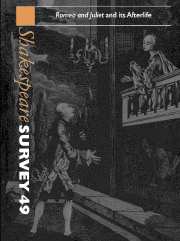Book contents
- Frontmatter
- The Challenges of Romeo and Juliet
- The Date and the Expected Venue of Romeo and Juliet
- The ‘Bad’ Quarto of Romeo and Juliet
- Shakespeare’s Romeo and Juliet: The Places of Invention
- ‘Death-marked love’: Desire and Presence in Romeo and Juliet
- Carnival and Death in Romeo and Juliet: A Bakhtinian Reading
- Ideology and the Feud in Romeo and Juliet
- Bawdy Puns and Lustful Virgins: The Legacy of Juliet’s Desire in Comedies of the Early 1600s
- Picturing Romeo and Juliet
- Nineteenth-Century Juliet
- ‘O, what learning is!’ Pedagogy and the Afterlife of Romeo and Juliet
- The Film Versions of Romeo and Juliet
- The Poetics of Paradox: Shakespeare’s Versus Zeffirelli’s Cultures of Violence
- ‘Lawful deed’: Consummation, Custom, and Law in All’s Well That Ends Well
- ‘Have you not read of some such thing?’ Sex and Sexual Stories in Othello
- French Leave, or Lear and the King of France
- The Actor as Artist: Harold Hobson’s Shakespearian Theatre Criticism
- Shakespeare Performances in England, 1994–1995
- Professional Shakespeare Productions in the British Isles, January-December 1994
- Critical Studies
- Shakespeare’s Life, Times, and Stage
- Editions and Textual Studies
- Books Received
- Index
Ideology and the Feud in Romeo and Juliet
Published online by Cambridge University Press: 28 March 2007
- Frontmatter
- The Challenges of Romeo and Juliet
- The Date and the Expected Venue of Romeo and Juliet
- The ‘Bad’ Quarto of Romeo and Juliet
- Shakespeare’s Romeo and Juliet: The Places of Invention
- ‘Death-marked love’: Desire and Presence in Romeo and Juliet
- Carnival and Death in Romeo and Juliet: A Bakhtinian Reading
- Ideology and the Feud in Romeo and Juliet
- Bawdy Puns and Lustful Virgins: The Legacy of Juliet’s Desire in Comedies of the Early 1600s
- Picturing Romeo and Juliet
- Nineteenth-Century Juliet
- ‘O, what learning is!’ Pedagogy and the Afterlife of Romeo and Juliet
- The Film Versions of Romeo and Juliet
- The Poetics of Paradox: Shakespeare’s Versus Zeffirelli’s Cultures of Violence
- ‘Lawful deed’: Consummation, Custom, and Law in All’s Well That Ends Well
- ‘Have you not read of some such thing?’ Sex and Sexual Stories in Othello
- French Leave, or Lear and the King of France
- The Actor as Artist: Harold Hobson’s Shakespearian Theatre Criticism
- Shakespeare Performances in England, 1994–1995
- Professional Shakespeare Productions in the British Isles, January-December 1994
- Critical Studies
- Shakespeare’s Life, Times, and Stage
- Editions and Textual Studies
- Books Received
- Index
Summary
Romeo and Juliet are very young. They are young to be married, and also young to be protagonists in a tragedy. Shakespeare made a special point of Juliet's extreme youth, first subtracting two years from the already tender age of Arthur Brooke's heroine (instead of sixteen, just under fourteen), and then having the characters disagree more than once over whether she is old enough to marry. Romeo, presumably somewhat older than Juliet, is nevertheless not yet grown up: still in the family home, fussed over by his parents, free to roam about with his friends but apparently not seen as ready for adult responsibility.
Why did Shakespeare insist on his tragic lovers as adolescents? To be sure, their youthfulness accentuates the generational conflict implicit in the story, the tragic disjunction that Franco Zeffirelli exploited so well in his compelling film version. But the extreme youth of Romeo and Juliet opens up a possibility beyond the traditional clashes of young and old. The very embeddedness in family that signals their tender years may itself be the point. It is surely significant that each of the two protagonists is introduced to us first as the object of parental concern. In the opening scene the Montagues worry about Romeo's solitary moping, fearing that some secret sorrow may blight their promising son before he ever arrives at maturity. In the scene directly following, Capulet is busy providing for his daughter's future by negotiating her marriage with Paris. It is important that each of these parental discussions takes place before we even meet the young person being discussed. Our initial view is of Romeo as a son, Juliet as a daughter.
- Type
- Chapter
- Information
- Shakespeare Survey , pp. 87 - 96Publisher: Cambridge University PressPrint publication year: 1996
- 1
- Cited by

